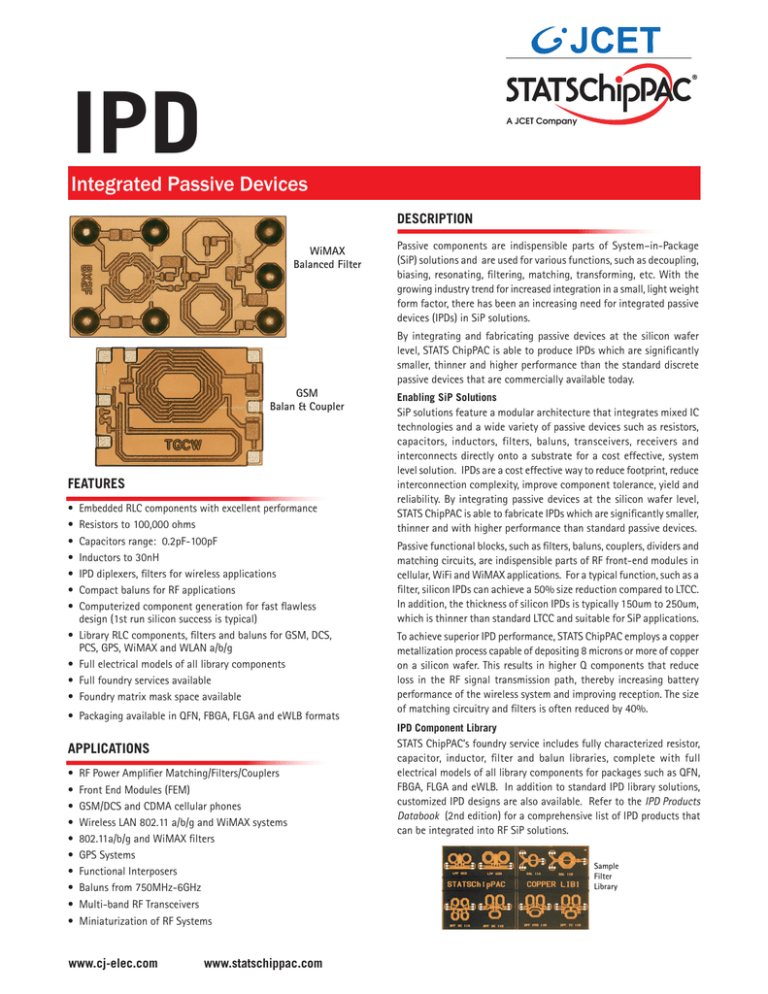
IPD
A JCET Company
Integrated Passive Devices
DESCRIPTION
WiMAX
Balanced Filter
Passive components are indispensible parts of System–in-Package
(SiP) solutions and are used for various functions, such as decoupling,
biasing, resonating, filtering, matching, transforming, etc. With the
growing industry trend for increased integration in a small, light weight
form factor, there has been an increasing need for integrated passive
devices (IPDs) in SiP solutions.
By integrating and fabricating passive devices at the silicon wafer
level, STATS ChipPAC is able to produce IPDs which are significantly
smaller, thinner and higher performance than the standard discrete
passive devices that are commercially available today.
GSM
Balan & Coupler
FEATURES
• Embedded RLC components with excellent performance
• Resistors to 100,000 ohms
• Capacitors range: 0.2pF-100pF
• Inductors to 30nH • IPD diplexers, filters for wireless applications
• Compact baluns for RF applications
• Computerized component generation for fast flawless design (1st run silicon success is typical)
• Library RLC components, filters and baluns for GSM, DCS, PCS, GPS, WiMAX and WLAN a/b/g • Full electrical models of all library components
• Full foundry services available
• Foundry matrix mask space available • Packaging available in QFN, FBGA, FLGA and eWLB formats
APPLICATIONS
• RF Power Amplifier Matching/Filters/Couplers
• Front End Modules (FEM)
• GSM/DCS and CDMA cellular phones
• Wireless LAN 802.11 a/b/g and WiMAX systems
• 802.11a/b/g and WiMAX filters
• GPS Systems
• Functional Interposers
• Baluns from 750MHz-6GHz
• Multi-band RF Transceivers
• Miniaturization of RF Systems
www.cj-elec.com
www.statschippac.com
Enabling SiP Solutions
SiP solutions feature a modular architecture that integrates mixed IC
technologies and a wide variety of passive devices such as resistors,
capacitors, inductors, filters, baluns, transceivers, receivers and
interconnects directly onto a substrate for a cost effective, system
level solution. IPDs are a cost effective way to reduce footprint, reduce
interconnection complexity, improve component tolerance, yield and
reliability. By integrating passive devices at the silicon wafer level,
STATS ChipPAC is able to fabricate IPDs which are significantly smaller,
thinner and with higher performance than standard passive devices.
Passive functional blocks, such as filters, baluns, couplers, dividers and
matching circuits, are indispensible parts of RF front-end modules in
cellular, WiFi and WiMAX applications. For a typical function, such as a
filter, silicon IPDs can achieve a 50% size reduction compared to LTCC. In addition, the thickness of silicon IPDs is typically 150um to 250um,
which is thinner than standard LTCC and suitable for SiP applications. To achieve superior IPD performance, STATS ChipPAC employs a copper
metallization process capable of depositing 8 microns or more of copper
on a silicon wafer. This results in higher Q components that reduce
loss in the RF signal transmission path, thereby increasing battery
performance of the wireless system and improving reception. The size
of matching circuitry and filters is often reduced by 40%.
IPD Component Library
STATS ChipPAC’s foundry service includes fully characterized resistor,
capacitor, inductor, filter and balun libraries, complete with full
electrical models of all library components for packages such as QFN,
FBGA, FLGA and eWLB. In addition to standard IPD library solutions,
customized IPD designs are also available. Refer to the IPD Products
Databook (2nd edition) for a comprehensive list of IPD products that
can be integrated into RF SiP solutions.
Sample
Filter
Library
IPD
A JCET Company
Integrated Passive Devices
RELIABILITY
SPECIFICATIONS
Die Thickness
Gold Wire
Marking
Packing Options
250mm (nom)
1.0mil
Laser mark (black or white)
JEDEC tray / tape and reel
Moisture Sensitivity Level
Temperature Cycling
UHAST (laminate package)
High Temperature Storage
Pressure Cooker Test (WLCSMP)
Liquid Thermal Shock
JEDEC Level 1
-65°C/150C, 1000 cycles
130°C, 85% RH, 96 hrs 150°C, 500 hrs
121°C 100% RH, 2 atm, 168 hrs
-65°C/150°C, 500 cycles
DESIGN and SIMULATION CAPABILITIES
Customer Input Parameters
Test &
Evaluation
Simulation
Substrate
layout
System
Schematic
Design
• Circuit design
• Circuit netlist
• System specification
• Power budget
• Dimension estimation
• Substrate stack up
• Component placement
• Low insertion loss, reflection
noise, signal cross talk dessign
• High TX/RX isolation design
• Impedance matching circuitry
• Return path design
• IPD design
• Signal & power integrity
• Shielding effectiveness
• Thermal
• Mechanical (warpage)
• System level simulation
• Performance optimization
• EVB design
• Test fixture design
• Component measurement
• System level test
PACKAGE CONFIGURATIONS
FBGA-SiP - LFBGA packages with body sizes up to and including 15 x 15 sq. mm. Refer to STATS ChipPAC’s FBGA datasheet.
FLGA-SiP - FLGA packages with body sizes up to 15 x 15 sq. mm. Refer to STATS ChipPAC’s FLGA datasheet.
WL CMSP - SiP package with body size of 10 x 10 sq. mm.
eWLB - IPD integrated in eWLB package with body size of 6 x 6 sq. mm or less.
WL CSMP
IPD - Standalone IPDs (balun, diplexer, LPF, BPF, etc.) for RF applications. Refer to STATS ChipPAC’s IPD Product Databook (2nd ed.) for a complete
product list.
Sample eWLB module containing a CMOS power amplifier chip (on the
right) and an IPD chip (on the left). The IPD chip is used for matching and
filtering functions. The interconnection between the CMOS chip and the
IPD chip is made by RDL through the eWLB process.
Corporate Office 10 Ang Mo Kio St. 65, #04-08/09 Techpoint, Singapore 569059 Tel: 65-6824-7777 Fax: 65-6720-7823
Global Offices
USA 510-979-8000
CHINA 86-21-5976-5858
KOREA 82-32-340-3114
SWITZERLAND 41-21-8047-200
The STATS ChipPAC logo is a registered trademark of STATS ChipPAC Pte. Ltd. Trademark registered in United States. Singapore company registration number 199407932D. All other product names and other company names herein are for identification purposes
only and may be the trademarks or registered trademarks of their respective owners. STATS ChipPAC disclaims any and all rights in those marks. STATS ChipPAC makes no guarantee or warranty of its accuracy in the information given, or that the use of such
information will not infringe on intellectual rights of third parties. Under no circumstances shall STATS ChipPAC be liable for any damages whatsoever arising out of the use of, or inability to use the materials in this document. STATS ChipPAC reserves the right
to change the information at any time and without notice.
©Copyright 2016. STATS ChipPAC Pte. Ltd. All rights reserved.
Apr 2016



